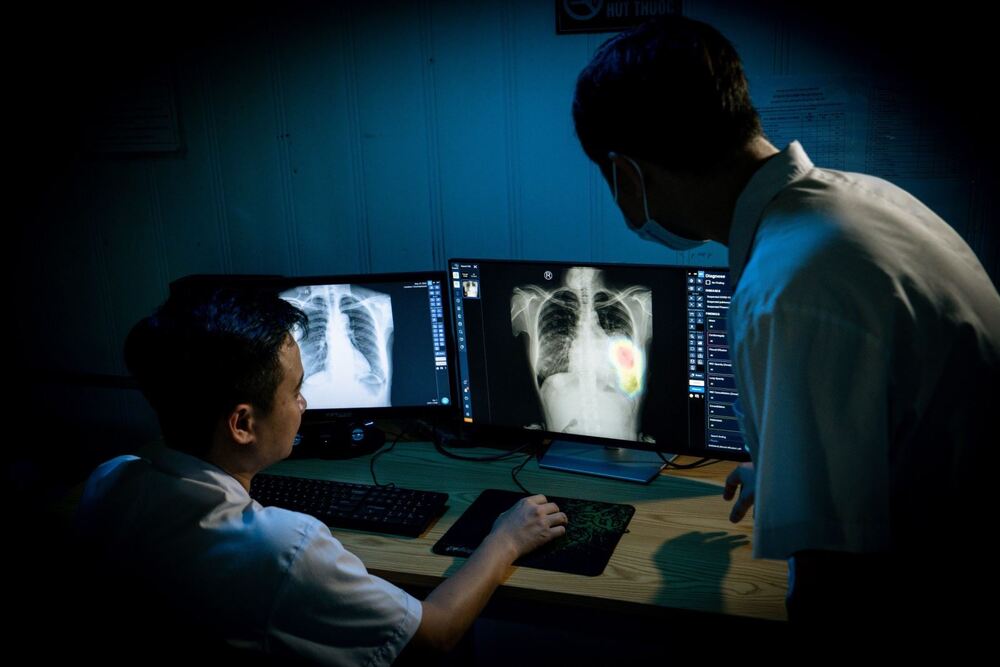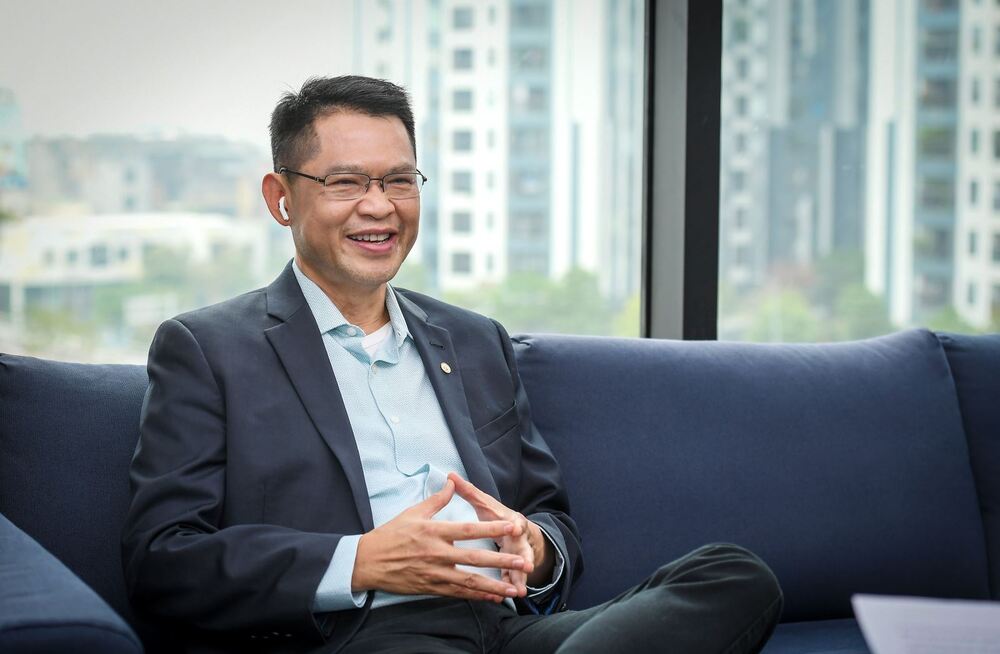
2024 has been determined by the Ministry of Information and Communications as the year to deploy AI technology applications in each industry and field. Technology using artificial intelligence in the medical field is being deployed. News reporters had an interview with Mr. Steven Truong, Founder and General Director of VinBrain around this topic.
To develop artificial intelligence technology in Vietnam, what resources do you think are needed? What is the position and potential of artificial intelligence technology in Vietnam compared to other countries in the world?
First of all, the resources needed, especially in the health sector, in my opinion include: Diverse and high-quality medical data. Next is the power of technology such as Computer Vision technology; Computing Technology; Graphics processing unit (GPU); Cloud Computing (Cloud Technology)...

Steven Truong, CEO and Founder of VinBrain.
A very important factor is human resources including: Applied scientists, AI coaches, System operation engineers, radiologists....
How do you evaluate the position and potential of artificial intelligence technology in the medical field in Vietnam, compared to other countries in the world?
When looking at the medical AI picture in Southeast Asia, we see a picture similar to the overall picture of AI in general, but with some interesting nuances. I think there are two groups. The leading group includes Singapore and Indonesia, with Singapore hosting nearly half of the region's data center capacity; leading initiatives such as: National Electronic Health Records (NEHR) and Integrated Health Information System (IHIS); Using AI for diagnostics, drug discovery and personalized medicine. As for Indonesia, this is an active area for US and Chinese suppliers, with a rich population (4th most populous country) and rich health data. They tend to use AI for diagnosis, using AI chatbots for mental health care like Tenyang AI.
The prospective group includes three countries: Malaysia, Thailand and Vietnam. In particular, Malaysia focuses on AI for preventive medicine, remote patient monitoring and optimization of medical resources; launched initiatives such as the Malaysia Health AI Roadmap and the MyEG Health AI platform. And Thailand deploys AI in telemedicine, chronic disease management and medical image analysis; has established AI research centers such as the National Digital Economy Promotion Agency (DEPA).
For Vietnam, a developing country, but one of the pioneering countries in using AI to early detect incurable diseases, the first unit to receive approval from the US FDA is VinBrain, developing precision medicine and virtual medical assistants for doctors.
In terms of potential, Vietnam's AI wave is in a promising phase and will explode in the near future. Our country possesses the necessary elements for success - a thriving technology platform, investment from large corporations, legal support from the Government and a pool of young emerging talents. However, solving data challenges, building trust, funding for AI application, synchronous infrastructure,... will be important factors for Vietnam to catch up with other countries. another leading member in the region.
To create these differences, what has VinBrain prepared and invested in artificial intelligence technology, sir?
We have a clear strategy when investing in AI including: Excellent team, domestic doctors with extensive knowledge, working with experts at many major universities in the world, setting high standards right from the start. aims to solve the problem more comprehensively.
With the viewpoint of "Standing on the shoulders of giants", VinBrain early on thought about cooperating with large units in the industry (Stanford, Harvard, Toronto...). These are units with a long history of research, gathering many leading doctors in the world; And we also "shake hands" with "technology giants" such as Microsoft and NVIDIA in creating core technology. We are using Azure cloud technology and Microsoft's Azure OpenAI artificial intelligence infrastructure, using Microsoft's Azure OpenAI artificial intelligence infrastructure. Using NVIDIA DGX A100 system, NVIDIA A100Tensor Core GPU, NVIDIA MONAI technology suite and NVIDIATensorRT software, all are the most powerful processors in the world today.
 Using AI technology in medical imaging.
Using AI technology in medical imaging.
80% of the company's operating budget is invested in R&D (research and development) activities, of which nearly 70% is for human resources.
The problem of AI technology for healthcare is a difficult problem because it involves people and human lives. If I want to do it, I think it first needs to come from the heart, wanting to create a broad impact on society and the community, so that everyone can benefit. I think if you have the right mind, all difficulties and challenges will be overcome.
From actual implementation, do you think it is difficult to develop and apply AI in Vietnam?
Yes, in my opinion it is very challenging. First of all, there are legal and ethical issues. We need a clear legal framework and ethical policy to ensure sustainable and transparent development in the field of AI.
Next is capital and support for policies and legal frameworks from the Government. In addition, there is a basic education system on AI technology and supporting technologies, and general technology infrastructure from central to local levels.
It is known that VinBrain's DrAid™ is the first solution in the world to support the diagnosis and treatment of cancer, especially liver cancer and rectal cancer through artificial intelligence technology. What makes DrAid™ special? Why is it so difficult to support the diagnosis and treatment of liver and rectal cancer?
The special thing about the DrAid™ cancer diagnosis and treatment product line is that it dares to take the lead, research and develop products that have never existed before. The product has features to support liver cancer specialists in treatment; Bringing value to the entire treatment process, not just diagnosis as other foreign units provide.
Product quality is guaranteed by prestigious international certifications and awards: ISO13485:2016, top 3 ASEAN Digital Innovation Awards 2023 (Preparing to compete for Top 1 at the end of January in Singapore)...
We build large medical datasets through close cooperation with frontline hospitals, audited and labeled by experienced specialists and radiologists.
Regarding the challenge in supporting the diagnosis and treatment of liver and rectal cancer, in my opinion is the diversity and complexity of the disease from diagnosis to treatment. Liver cancer and rectal cancer are two types with many variations and different levels of complexity. Diagnosis and treatment recommendations sometimes require extensive knowledge and long-term experience from medical professionals. In addition, the challenge for doctors is to diagnose correctly and early so that patients have the opportunity for early treatment.
Besides, each patient has unique characteristics, requiring a personalized diagnosis and treatment process, which requires a comprehensive system to smoothly and comprehensively monitor this process. We provide a solution to this problem using Artificial Intelligence technology. This technology can support the detection of liver lesions using computed tomography (CT) results, providing the type of lesion, location and size with a diameter as small as 5mm, allowing the disease to be detected in early stage. Through DrAid™, doctors also reduce the average diagnosis time of 30 minutes/case to only 4 - 5 minutes/case.
Due to constant changes in medical data, AI technology like DrAid™ must continuously update and train to maintain accuracy.
Thank you very much!
Top